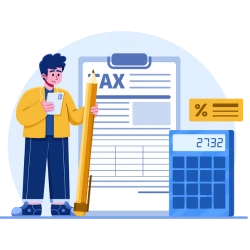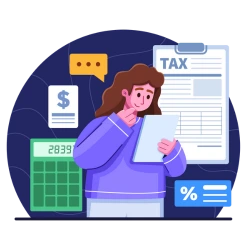Acquiring a tax ID number (TIN) for your new business is a necessary step in filing your business’ tax returns. In this post, we’ll explain what a taxpayer identification number is, how to get one for your business, and various other information business owners should know on the topic of tax ID numbers.
What is a TIN Number?
The tax identification number, known as a TIN, identifies your business to the IRS. It’s a unique nine-digit number. To complete your tax returns or communicate with the IRS, you’ll need a federal tax ID number.
With the exception of social security numbers (SSN), the IRS issues all tax ID numbers. The Social Security Administration (SSA) is the entity that issues SSNs. Non-U.S. taxpayers must obtain a foreign tax ID number. The country of origin issues this number to the individual.

Business tax ID structure
Individuals, corporations, and many other types of tax-paying entities must have a tax ID number. Each TIN is a set of numbers unique to the entity. Upon approval, the IRS assigns entities with their tax ID numbers.
Types of Taxpayer Identification Numbers
There are several types of federal tax ID numbers, so identifying which type you’ll need to apply for is important. To help you identify such, below contains information about the different types of tax ID numbers.
Social Security Number (SSN)

The most common type of taxpayer identification number is the social security number. Issued by the Social Security Administration, U.S. citizens, permanent residents, and certain temporary residents are eligible for a social security number. The format used for SSNs is XXX-XX-XXXX.
In order to access the following, you must have social security number:
- Legal employment
- Social security services
- Other government services.
Before a parent can claim a child as a dependent on their taxes, the parent must apply for an SSN for their child.

Employer Identification Number (EIN)
The employer identification number (EIN) identifies corporations, trusts, and estates to the IRS. These entities must pay taxes. While EINs and SSNs are different, both are nine digits long. However, the format used for EIN is XX-XXXXXXX.
If you qualify for an EIN, you must apply to the IRS to be issued a unique number. Businesses may apply for an EIN at no charge.
Preparer Tax Identification Number (PTIN)
Some individuals and business owners use a preparer, often a certified public accountant, to complete their taxes. The preparer tax identification number (PTIN) identifies the preparer that completed some or all a tax return.
Each filed tax return must include the listing of the PTIN. [1] IRS.Gov. “PTIN Requirements for Tax Return Preparers“. Accessed January 13, 2022. This rule was put into effect on January 1, 2011. It was optional before that date.

Individual Taxpayer Identification (ITIN)
The individual taxpayer identification number (ITIN) is available to be obtained by the following individuals:
- Nonresident and resident aliens
- Spouses of nonresident and resident aliens
- Dependents of nonresident and resident aliens (if not eligible for SSNs)
The ITIN has the same format as the SSN: XXX-XX-XXXX. Every ITIN begins with the number 9.
Form W-7, as well as records supporting the individual’s resident status, are among the documents necessary to submit when applying for an ITIN. Colleges, banks, accounting firms often help applicants in obtaining an ITIN.
Adoption Tax Identification Number (ATIN)
The adoption tax identification number (ATIN) is issued when individuals adopt a child. This temporary nine-digit number is for adopting parents who can’t obtain the child’s SSN in time to file taxes.

Foreign Persons and IRS Employer Identification Numbers
Foreign entities, such as foreign corporations, are not entities approved for a federal EIN. It’s required to claim an exemption from withholding because of a tax treaty.
Do I Need a Taxpayer Identification Number?
Included in the legal requirements to run a business or another type of organization, you must apply for a tax ID number. It’s necessary to have a TIN not only to file your taxes, but even to run your operations on a daily basis.
Authorized workers in the U.S. who plan to file taxes with the IRS must have a tax ID number. Also, for individuals planning to utilize the benefits or services offered by the government, a tax ID number is necessary.
How to Get a Tax ID Number
You can acquire a tax ID number by applying through the appropriate agency. Particularly for a business seeking an EIN, you can obtain one from the Internal Revenue Service.
It’s essential you collect the necessary information before starting your online application process. Upon completing the application, you should receive your EIN immediately. At this point, you can download, print, or otherwise save your EIN confirmation for future reference.

Does my business qualify?
You will need an EIN if your business does any of the following:
- Compensates employees
- Operates as a corporation or partnership business structure
- Files tax returns for employment, excise, or alcohol, tobacco, and firearms
- Withholds taxes on income (other than wages) that’s paid to a non-resident alien
- Uses a Keogh Plan (tax-deferred pension plan)
- Works with any of the types of organizations listed:
- Trusts, with the exception of certain grantor-owned revocable trusts
- Estates
- Real estate mortgage investments conduits
- Non-profit organizations
- Farmers’ cooperatives
- Plan administrators
Do not apply for an EIN more than once per day
The IRS states that a responsible party may apply for an EIN. The limit is once per day. This rule went into effect on May 21, 2012, to ensure that all taxpayers receive fair treatment. . Requests executed online, by fax, or by mail are applicable to this limitation.

Receive your federal tax identification number
Once submitted, the IRS verifies your information. As long as everything is accurate, you’ll receive your EIN immediately. Depending on your state, you may also need to acquire a state number or charter.
TIN Lookup: Where Can I Find My Tax Identification Number?

You may find it necessary to look up your tax ID number, or specifically look up your EIN, if you’ve lost or misplaced it. Here are your options:
- Locate the notice issued by the IRS when you applied for your EIN. The EIN should be on this receipt.
- Contact the bank through which you opened a business account, as they may be able to obtain this information for you.
- Find a previous tax return filed with the EIN. This return should have your EIN listed.
- Call the Business & Specialty Tax Line at the IRS and ask them for your EIN.
Final Thoughts
When starting a new business, it’s likely you’re looking forward to accepting your customer’s payments more so than the processing of filing your taxes for those payments. While filing taxes may not be one of the more alluring elements of business ownership, obtaining a tax ID number (in this case, an EIN) is a fairly straightforward process. In following the application steps, the process can be complete in one sitting, with your EIN issued immediately. Then, you’re free to focus on other aspects of business ownership.






